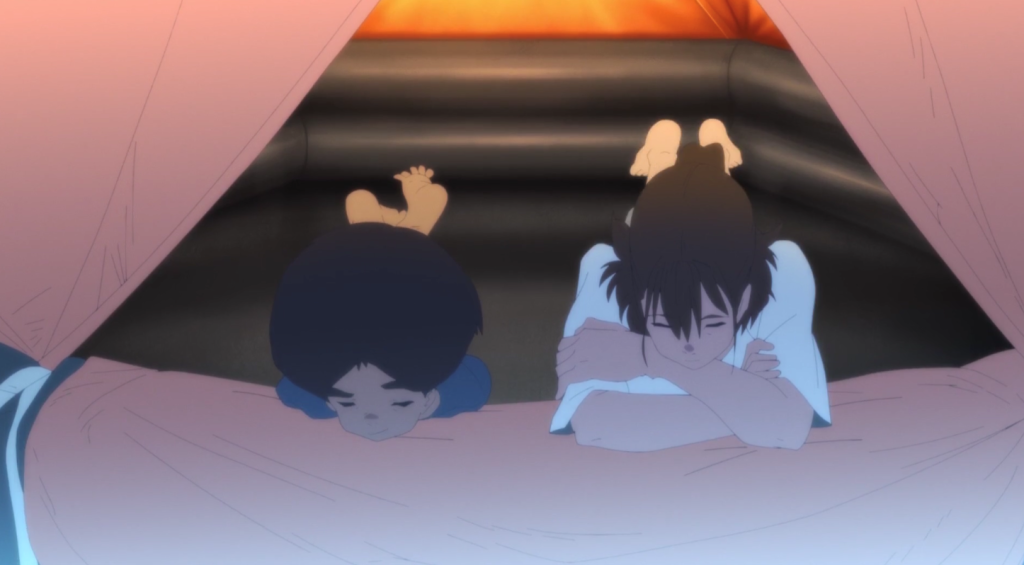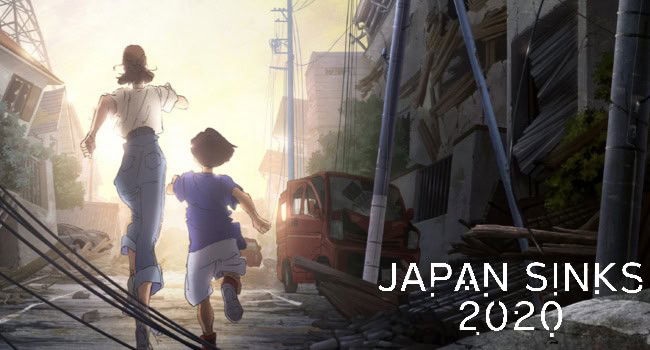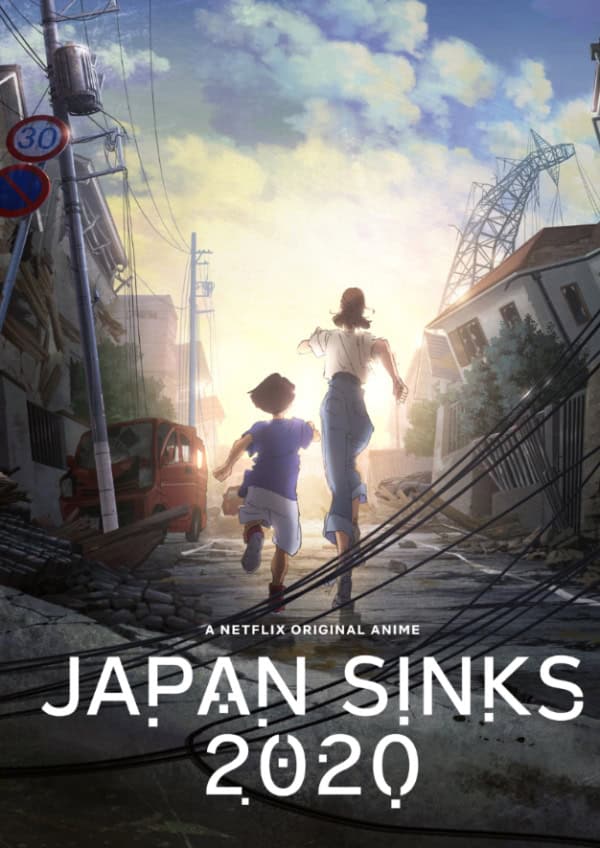Original Release: July 9, 2020 Number of Episodes: 10 Genre: Drama, Science Fiction Based on the Novel Written By: Sakyo Komatsu
***Warning, the following may contain spoilers for Japan Sinks: 2020. Reader discretion is advised.***
Series Synopsis
Japan has just played host to the 2020 Olympic Games, and the whole world had its eyes on the island nation, home to millions of people. Now, life tries to return to normal. However, Japan will once again be in the minds of everyone as they watch its demise.
A massive series of earthquakes shake the entire country, triggering destruction on an unprecedented scale. Thousands die within hours, but the worst has yet to come.
Our story follows the Mutou family as they struggle to survive this nightmare. Unfortunately, there is nowhere to run as Japan begins to sink back into the ocean.

Series Positives
Japan Sinks: 2020 (Japan Sinks) was underwhelming. I must say, I was happy this series was only ten episodes long. I lost all interest in the story and its characters quickly. That was a shame since this show had a strong start.
I am not the biggest fan of disaster narratives, particularly ones that sound fantastical. The more far-fetched the scenario, the higher the likelihood I won’t gravitate to what is happening. Therefore, you might think the idea of an entire country sinking into the ocean would be a bit too much for me. It probably would have been, if not for a few crucial aspects.

If there were any country I would suspend my disbelief and buy the idea that the sea could swallow it, it would be Japan. In regards to this show, I was even able to accept Japan could disappear within a week. For me, this was doable because, as many of you might know, I am currently living in Japan. The thought of an apocalyptic earthquake isn’t in the realm of science fiction.
It was only nine years ago (as of this review) that the great Tohoku earthquake and tsunami struck the northeastern coast of Honshu. That was four years before I arrived in the country. However, my Japanese friends, many of whom were nowhere near the disaster zone, vividly remember the horror of the ground violently shaking and tossing everyone to the floor.

Originally from California, earthquakes have always been apart of my life. That’s why I tell my friends who’ve never experienced one to worry only when they see me worried. Be that as it may, there was an earthquake that managed to do that. The notion of a seismic event being so powerful it could sink Japan might be fantastical. Nevertheless, I can imagine what that might look like.
And Japan Sinks did a frighteningly good job of portraying such a cataclysm.
Episode one consisted of the initial earthquake, and to call it destructive would be an understatement. What was more impressive than the sheer size of the event was how terrifying it was. The fear factor wasn’t so much about the buildings crumbling and people being tossed like ragdolls. No, it was about how real this part of the much larger, more fictitious disaster felt. An earthquake the size of what was seen in Japan Sinks, if something like that ever struck Tokyo, the city would be leveled.

And to keep you up at night, the earthquake in episode one was about the same magnitude as the real one back in 2011. These mega-quakes are very much real.
Following this unquestionably excellent opening, Japan Sinks continued to do well as it followed the characters as they tried to make sense of the initial blow. It wasn’t until they learned that Japan was sinking did things start to go downhill for this series.
Japan Sinks had a single operating idea:
How do we make an already bad situation worse? And if things are already worse, how do we make them too much?

Series Negatives
If you want to see an excellent disaster anime, then I suggest you check out Tokyo Magnitude 8.0. Here was a series that told a terrifying tale of nature’s destructive power, much like Japan Sinks. The difference; it was engaging for eleven episodes instead of only two.
In Japan Sinks, it was already bad enough the sea was swallowing up the entire country. As things go, it’s hard to get more devastating than that. However, this series ensured everything that could go wrong would go horribly wrong. Then, in case that wasn’t bad enough, let’s have more things go wrong for no more reason than to f@#$ with the characters.

For example, in the very first episode (yes, the one I said was well-done), there was a helicopter crash. Not only that, but the passengers also rained down on our characters in a traumatic scene of bodies and blood. Why add this?
In every single episode, there was nothing but escalation. And it was an escalation on such a severe scale that you eventually stop caring about the characters. I mean, if they are all going to die, often in incredibly violent ways, why should I bother getting invested in them?

I can accept that a scenario where a person’s entire country disappears would be hopeless. Still, this series seemed more focused on throwing as much BS at its characters as possible instead of taking the time to get to know who everyone was. And weirdly, the never-ending onslaught of tragedy after tragedy took away from the much more significant impact of Japan sinking.
This show did well at illustrating how multiple massive earthquakes could reshape the land in dramatic ways. But never once did the full weight of the disaster set in. After all, when Japan eventually did go under, the characters were already at sea. There was no real sense of what it might look like if Earth’s seventh-largest island suddenly disappeared.
Like I said at the beginning, Japan Sinks was underwhelming.
And that doesn’t even take into account all the other annoying bits about this series.

The animation, for instance, was not consistent. Japan Sinks was directed by Mr. Masaaki Yuasa, who has given us the visually brilliant Kaiba, Devilman Crybaby, and 2020’s own Keep Your Hands Off Eizouken. All three of those shows were amazing to watch for the art style alone – albeit I did not care about Devilman Crybaby’s story. So, when I realized Japan Sinks would be under the care of Mr. Yuasa, I expected things to, at least, look cool.
Sadly, that wasn’t the case.
Japan Sinks employed a lot of awkward CGI. Plus, there were many times character models reverted to flesh-colored blobs in a few of the more high action scenes. Even during the initial earthquake, the visuals were a bit bland; the scene only worked because the idea was frightening enough.

Finally, and this was infuriating, whoever thought it was a good idea to incorporate English into this story needs to be fired. This was classic anime “Engrish” that sounds f@#$ing stupid. I know a few characters were full or half Filipino, and someone was actually from the UK, but the actors who played them sure as hell weren’t. The accents were atrocious, the word choices were unnatural, and you could tell the people reading the English lines were not comfortable in the language. These poor deliveries often turned somber and sad scenes into unintentionally hilarious ones.
As I mentioned earlier, I was glad Japan Sinks was only ten episodes long. Near the end, it became hard to sit through.

Final Thoughts
I feel I need to repeat myself – underwhelming.
This series didn’t have a bad idea, seeing how it was an extreme version of what already happens in real life. Something could have been here. However, this story had way too much going on, and that’s not including a country getting destroyed.
When it is all said and done, this show was messy, cumbersome, and, at times, dull.
Therefore, I cannot give Japan Sinks: 2020 a recommendation.
But these are just my thoughts. What are yours? Have you seen this series? How would you advise Japan Sinks: 2020? Leave a comment down below because I would love to hear what you have to say.
And if you’ve liked what you read and want more anime content, please follow me at LofZOdyssey Anime Reviews or on Twitter @thelofzodyssey.
Also, be sure to subscribe here at The Outerhaven and never miss any of your video game, anime, and other nerdom news and content.
Also Read: Keep Your Hands Off Eizouken Series Review: Imagine, One Frame At A Time



